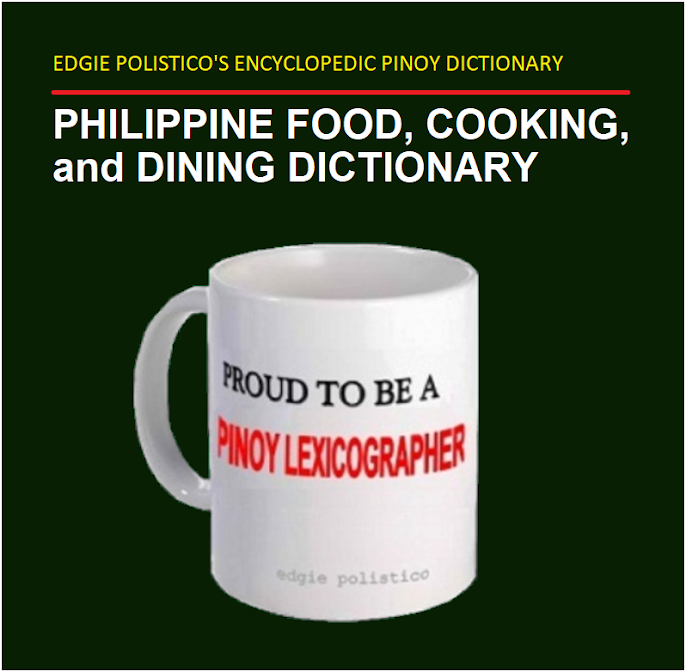
pebre - /peb-re/ Caviteño sauce/condiment; dw Chilean (Chile, South America) pebre [salsa of assortment of chopped spices, tomatoes, and pepper] = Catalan (Catalonia region, Spain) pebre [pepper]) [n.] lechon sauce \liver sauce for lechon baboy.
Similar local dishes:
- lechon sauce or sarsa ng litson in Tagalog
- lechon sauce in Cebuano, Ilonggo, Ilocano, Capampangan, and other Philippine languages and vernaculars
This lechon sauce of Cavite City is used to be for lechon baboy (roasted pig) only, but later on served also as a dipping sauce for other roasted and fried dishes, such as litson manok (roasted chicken), fried pork chop, pritong isda, even for lumpia.
It has a paste of ground cooked liver of pig (or chicken), bread crumbs, water, brown sugar, onion, garlic, other spices, salt, and ground peppercorn. Named after the Chilean condiment of the same name but the foreign salsa is quite different being that it has no liver in the ingredients but an assortment of spices, ground or pureed spicy aji peppers, and chopped tomatoes, and may vary in different regions of Chile.
The word pebre in Catalan (Catalonia in northeastern Spain and partly southern France) refers to the pepper of any type.
The Caviteño pebre is a combination of sweetness and sourness and the peppery piquancy of ground peppercorn. This is the origin of your fave Mang Tomas sauce, a popular commercial liver sauce for your lechon baboy and litson manok.
It has a paste of ground cooked liver of pig (or chicken), bread crumbs, water, brown sugar, onion, garlic, other spices, salt, and ground peppercorn. Named after the Chilean condiment of the same name but the foreign salsa is quite different being that it has no liver in the ingredients but an assortment of spices, ground or pureed spicy aji peppers, and chopped tomatoes, and may vary in different regions of Chile.
The word pebre in Catalan (Catalonia in northeastern Spain and partly southern France) refers to the pepper of any type.
The Caviteño pebre is a combination of sweetness and sourness and the peppery piquancy of ground peppercorn. This is the origin of your fave Mang Tomas sauce, a popular commercial liver sauce for your lechon baboy and litson manok.
All photos by Edgie Polistico in this blog are copyrighted. ALL RIGHTS RESERVED.
If you liked this post, share it.
Let us know your opinion on the subject. Feel free to comment in the comment section, below. It is important for us to know what you think.
Tell us what other topics you would like us to write, share, and discuss.
Continue to follow my blogs. You can also follow and learn more by joining us in our Facebook group. Have more bits and pieces about our kind of food, ingredients, and ways of cooking, dining, and knowing food culture across the 7,641 islands of the Philippines. I will search for more and continue to share my findings. It is my pleasure to rediscover the known and least known things or the unheard ones and put them here for everyone to find, learn, and treasure.
Thank you for all the encouragement and enthusiasm. I need your moral support, prayers, and anything else that can uplift my spirit and keep my good reasons. Keep them coming.
Sharing is happiness to me. If you are pleased and happy with what you found here, please share the happiness we have in the PHILIPPINE FOOD ILLUSTRATED. I feel energized when it becomes part of the reasons why you are happy and smiling.
For more about Filipino food, see this Philippine Food, Cooking, and Dining Dictionary. It is OPEN and FREE.





